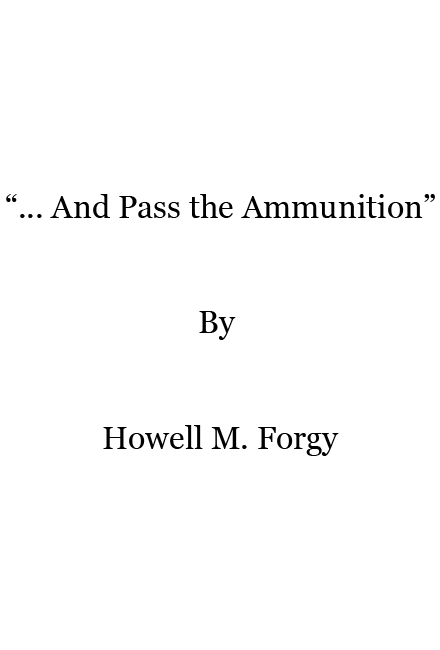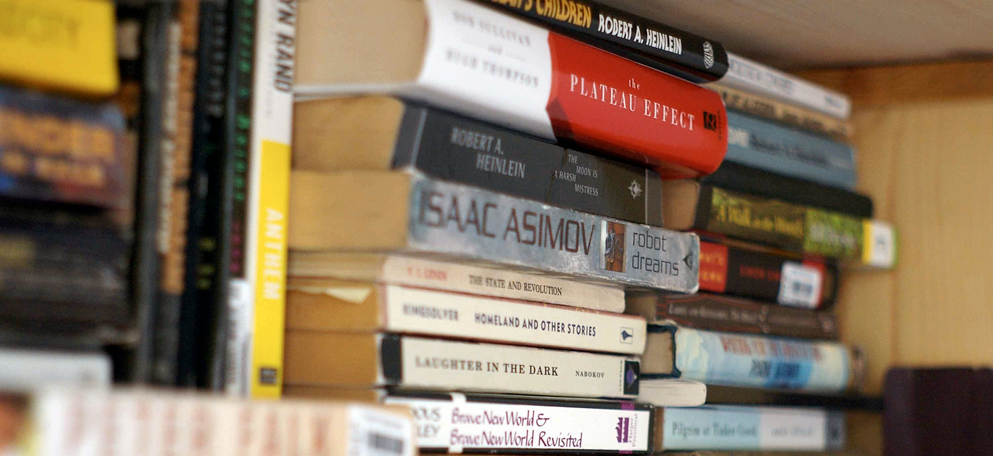
This book was given to me by my Gramma Mary - her husband - Papa Bob served on the USS New Orleans, and while not mentioned in this book, he was there during all the things described. The NoBoat(as so called by her crew) survived the attack on Pearl Harbor on Dec. 7th, 1941 - and went on to fight in the pacific. The fact that this comes from the perspective of the Chaplain on board gives it a different feeling that what I anticipated. Chaplain Forgy served as a counselor, pastor, friend, and much more during his time on the NoBoat. What follows is a small part of what those men experienced during this nations time of war.
Quotes and thoughts while reading:
"I told him I thought this was carrying a drill pretty far."
"I don't know, Padre. This might be the real thing."(p 4) To me, this might be one of the scariest quotes. It was the real thing - the peace and tranquility of that Sunday morning was interrupted by enemy planes.
"Off our starboard quarter, about five hundred yards, the mighty Arizona was sending a mass of black, oily smoke thousands of feet into the air. The water around her was dotted with debris and a mass of oil-covered heads. I could see hundreds or men splaching and trying to swim. Others were motionless."(p 5) I think it's easy to forget what happened. People don't talk about it too much anymore - but this must have been a shocking event for the US.
Going off of the fact that this was a shocking event for the US - Lieutenant Kyron C. Curley stated while surveying the aftermath of Pearl Harbor: "That," he clipped in quiet, determined words, "is the end of the Japanese Empire."(p 12) That event(as most terrorist events seemingly do) unified the US against the Japanese, and by proxy the Germans, and got us involved in WWII. I'll never understand the rationale that thinks a country will just shirk away, and tuck it's tail defeated.
"The boy from the Oakie was sitting up in bed. His pain had been numbedby the morphine shots, and he was peeling off the remaning skin of his hands along with a layer of flesh, like a kif back home with his summer sunburn."(p 18) Jesus, that's terrible - and is an example of the ravages of war, and the type of thing my Grandfather would have seen.
"I lay in my bunk and relived every minute of they day. I kept telling myself this was war. America was at war, I was at war, and this was just the start. This horrible day of cnarnage was just the beginning. ...I was anxious to get to sea. I wanted to be along with the men of the No-Boat when they struck back and balances this day on the history ledger of the world."(p 20) It's interesting to hear Chaplain Forgy, lalter in the book, talk about his struggle with pacifism - and I can imagine how - on this day particulary, the struggle was furthest away. He'd just been to the hospital, and seen "god's children" hurt, bloodied, burnt, and killed - and now he was ready to see the balance to that. I also note - it's not him who is going "balance the ledger" but the men, and it's simply that he wants to be along with them. So his pacifism is still there, just a little more veiled.
"...Forgetting those things which are behind, and reaching forth unto those things which are before."(p 22) Pauls words which were to be spoken at the Sunday service - astoundingly fitting.
"We didn't know then that this old Wurlitzer, probably a derelict from some beer parlor or roadhouse would survive some of the war's bloddiest fighiting and play close to one hunred thousand records in the months to come. For the thirty-five dollar investment we received a ten-thousand-dollar return in morale... Dr. Evans had studied the experiments the navy medical department had been conduting with the use of paraffin in the treatment of burns and was anxious to have a supply in his sick bay sotre. "Painless" Farguhar and I searched high and low for paraffin and finally located twenty-five points on the shelf of a Safeway grocery store. Little did we appreciate then that this paraffin, intended for the preserves of some housewife, would soon be sprayed from Flit guns to save the lives of dozens of the horribly burned men from the U.S.S. Lexington in the Battle of the Coral Sea."(p 52) I found it amazing the breadth of job duties the Chaplain had - from morale - to onshore purchasing. That really is a pretty fortuitous strike of luck they had.
"... each night found dozens of men sitting about the phonobridge in the mess hall, busily engaged in games of bridge, acey-ducey, chess, checkers, rook, monopoly, and more than a dozen others. Old-timers of the enlisted personnel told me that the New Orleans after the games were made available, had less cambling than any other ship they had been aboard. ...It has been said that morale on a warship beginss in the wardroom. And you could tell by looking into the No-Boat's wardroom, that she was a happy ship."(p 57-58) This mainly left me thinking about what a ship looks like today. With internet, skype, smartphones(the list goes on) - the things to do on a ship must be very different. I wonder if one is better than the other. I imagine the older ships had a better connected crew - but I don't have any data to back that up.
"Up all bunks; up all bunks." From the slurred words the men created the mythical character of "Paul Bunks" who awakened them.
"did we get hit? We've been in this list an awfully long time. Feels like we're taking on water. ...Below decks we had no way of knowing that the task force was swinging about in a whide turn and that the bomb that lifted the No-Boat had not touched us. It was a near miss that exploded in the sea about a hundred feet off our fantail and sent a tidal wave of water cascading over the aft of the ship."(p 100)
"Men sweated under their heavy steel helmets. Their trousers were tucked under their socks to cover any portion of skin that might be vulnerable to the searing bomb flashed. Gone was the bravado of going into battle with shirt sleeves rolled. Sleeves of many were pulled down and tucked into gloves. We had learned in the few short hours of the Coral Sea battle - and from the horrifying sights of sick bay - that these precautions were no unwarranted. We moved in for the Battle of Midway, squirming unconfrtably but uncomplaining in the hot battle gear. Thirteen long, fatiguing hours were to pass before these bonds of battle could be removed."(p 131) It's hard to imagine this - and it's even more shocking to realize that my Grandpa served on this boat - and was going through this very thing.
Getting married before leaving for the war was really common - and I'm not sure why. The Chaplain recounts that the girl he was courting - suddenly became his wife. He donned the navy blue and gold - and then reported to training. I mean, why? Why not just go to war single? Did you need someone to fight for? Or to not die single? Things to ponder a bit.
"Before us we had seen the navy aviators of the United States score one of the greatest air victories of all time. The Japs send eighty-five bombers at us in that mighty squadron. Fighters from the Enterprise and Saratoga knocked down forty-six of them. Anti-aircraft fire blasted another twenty-fice into oblivion. The remaining fourteen ran for home. It has not always been so lucky for us, but today fate rode in the cockpits with our pilots. ...The whole action, from start to finish, consumed no more than five minutes." (p 156-157) See, here I get caught thinking about the jingoism of Chaplain Forgy, and his pursuit of pacifism. He's not killing anyone - but he is celebrating the deaths of others. And I think that's where the rubber meets the road - the Japs aren't people to Forgy - they are the Japs(or more simply put - an other).
"...He's found what so few people do find - happiness. He hasn't much to live by, but he has everything to live for."(p 177) The true purpose to life.
"The helmsman swung the wheel. With aggravating slowness the No-Boat began to make to starboard. ...At that instant the world blew up in my face. The ship jumped with a violent whip. The force of the explosion blew me across the deck and jammed me into the steel bridge shield. ...I opened my eyes to find we were in a cave of fire. One solid sheet of flame had enveloped the No-Boat, and I could see the fire reaching more than hundreds of feet above the mast."(p 190) Whew! They lost everything forward of turret two, "about a wuarter of the fighthing ship, complete with Turret One and four decks of libing, breathing men, had been despatched from the world in one blinding flash."(p 195)
"...Soon the well deck was nearly covered with out dead. More than seventy bodies of our shipmates, our living breathing companions less than twenty-four hours earlier, were laid on the deck before us."(p 209)
"Here were the wallets, trinkets, high-school rings, letters from sweethearts, wives, and parents; the little pictures of the Sacred Heart of Jesus, the little My Missal books, the pocket New Testaments, etc., and photographs of the folks at home. Here were the private, secret treasures of the men who but a few days before had been proud, living, breathing sailors of this ship. What heartaches these packages would bring to fathers, mothers, sisters, wives, brothers and sweethearts, I thought. Yet here were the things they would treasure forever with their memory of these boys."(p 225) That might be the hardest thing to do - sift through the posessions - and mail them home to the families.
"America in the future must not live under the illusion that she could reside in indifferent isolation from the rest of the world. This was one world, and the increasing pace of transportation and communication had made it a mighty small world, at that. All nations of the earth were not neighbors. They would have to learn to be good neighbors."(p 238)
"There were tears in my eyes, for somehow I could not help thinking that when enough people really praise the Loard, it will no longer be necessary to pass the ammunition."(242) The closing quote of the book - which certainly leaves you something to chew on.
Overall this was a fascinating time machine - to jump back into those war years - and to get a very real image of what those years looked and felt like. It's not something this world should forget - and I hope it doesn't.
<< click to go back
© JKloor 2016 Books
